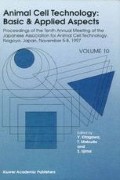Abstract
We have produced a recombinant C-terminal α-amidating enzyme (799Bg/IIα-AE) derived from Xenopus laevis by culturing a CHO cell line named 3μRecently, we demonstrated that culturing μ-1S cells at a temperature below 37°C led to the following phenomena: inhibited cell growth with high viability, enhanced cellular productivity (maximally at 32°C), and suppressed medium consumption and release of impurities from the cells. Therefore, it is suggested that the 799Bg/IIα-AE production will be increased by culturing a sufficient number of the cells at a low temperature (especially at 32°C). Application of the low temperature culture to batch and perfusion cultures was effective in comparison with the culture at 37°C: the productivity per medium and the productivity per time were increased several fold with enhanced cellular productivity at a low culture temperature. The low temperature culture also increased the relative content of 799Bg/IIα-AE in the supernatant and reduced the glucose consumption.
Access this chapter
Tax calculation will be finalised at checkout
Purchases are for personal use only
Preview
Unable to display preview. Download preview PDF.
References
Rasmussen P (1991) Method of producing proteins wilh FVIII activity and/or FVIII derivatives. Patent WO 91/00347.
Weidemann R, Ludwig A & Krezmer G (1994) Low temperature cultivation — A step towards process optimization. Cytotechnology 15: 111–116.
Chuppa S, Tsai Y-S, Yoon S, Shackleford S. Rozales C, Bhat R, Tsay G. Matanguihan C, Konstantinov K & Naveh D (1997) Fermentor temperature as a tool for control of high-density perfusion culture of mammalian cells. Biotechnol. Bioeng. 55: 328–338.
Furukawa K & Ohsuye K (1998) Effcet of culture temperature on a recombinant CHO cell line producing a C-terminal α-amidaling enzyme. Cytotechnology 26: 153–164.
Furukawa K, Okuno K, Onai S, Sugimura K, Yoko-o Y, Ishibashi Y, Ohshima T, Tsuruoka N, Magota K, Tanaka S & Ohsuye K (1993) Production of an αami dating enzyme (α-AE) in recombinant CHO cells. In: Kaminogawa S et al. (eds.) Animal Cel Technology: Basic & Applied Aspects, Vol. 5 (pp. 493–499) Kluwer Academic Publishers, The Netherlands.
Eiper BA, Mains RE & Glembotski CC (1983) Identification in pituitary tissue of a peptide α-amidation activity that acts on glycine-extended peptides and requires molecular oxygen, copper, and ascorbic acid. Proc. Natl. Acad. Sci. USA 80: 5144–5148.
Mizuno K. Sakata J. Kojima M, Kangawa K & Matsuo H (1986) Peptide C-terminal α-amidating enzyme purified to homogeneity from Xenopus laevis skin. Biochem. Biophys. Res. Comm. 137: 984–991.
Ohsuye K, Kitano K. Wada Y. Fuchimura K, Tanaka S, Mizuno K & Matsuo H (1988) Cloning of cDNA encoding a new peptide C-terminal α-amidaling enzyme having a putative membrane-spanning domain from Xenopus laevis skin. Biochem. Biophys. Res. Comm. 150: 1275–1281.
Author information
Authors and Affiliations
Editor information
Editors and Affiliations
Rights and permissions
Copyright information
© 1999 Kluwer Academic Publishers
About this chapter
Cite this chapter
Furukawa, K., Ohsuye, K. (1999). Enhancement of Productivity of Recombinant α-Amidating Enzyme by Low Temperature Culture. In: Kitagawa, Y., Matsuda, T., Iijima, S. (eds) Animal Cell Technology: Basic & Applied Aspects., vol 1. Springer, Dordrecht. https://doi.org/10.1007/0-306-46865-4_27
Download citation
DOI: https://doi.org/10.1007/0-306-46865-4_27
Publisher Name: Springer, Dordrecht
Print ISBN: 978-0-7923-5451-2
Online ISBN: 978-0-306-46865-0
eBook Packages: Springer Book Archive

